 In
the reign of the famous King Edward III there was a little boy called
Dick
Whittington whose father and mother died when he was very young. As
poor
Dick was not old enough to work, he was very badly off; he got but
little
for his dinner, and sometimes nothing at all for his breakfast; for the
people who lived in the village were very poor indeed, and could not
spare
him much more than the parings of potatoes, and now and then a hard
crust
of bread. In
the reign of the famous King Edward III there was a little boy called
Dick
Whittington whose father and mother died when he was very young. As
poor
Dick was not old enough to work, he was very badly off; he got but
little
for his dinner, and sometimes nothing at all for his breakfast; for the
people who lived in the village were very poor indeed, and could not
spare
him much more than the parings of potatoes, and now and then a hard
crust
of bread.
Now Dick had heard
many, many
very strange things about the great city called London; for the country
people at that time thought that folks in London were all fine
gentlemen
and ladies; and that there was singing and music there all day long;
and
that the streets were all paved with gold.
One day a large
wagon and eight
horses, all with bells at their heads, drove through the village while
Dick was standing by the signpost. He thought that this wagon must be
going
to the fine town of London; so he took courage, and asked the wagoner
to
let him walk with him by the side of the waggon. As soon as the wagoner
heard that poor Dick had no father or mother, and saw by his ragged
clothes
that he could not be worse off than he was, he told him he might go if
he would, so off they set together.
So Dick got safe to
London,
and was in such a hurry to see the fine street paved all over with gold
that he did not even stay to thank the kind wagoner; but ran off as
fast
as his legs would carry him, through many of the streets, thinking
every
moment to come to those that were paved with gold; for Dick had seen a
guinea three times in his own little village, and remembered what a
deal
of money it brought in change; so he thought he had nothing to do but
to
take up some little bits of the pavement, and should then have as much
money as he could wish for.
Poor Dick ran till
he was tired,
and had quite forgot his friend the waggoner; but at last, finding it
grow
dark, and that every way he turned he saw nothing but dirt instead of
gold,
he sat down in a dark corner and cried himself to sleep.
Little Dick was all
night in
the streets; and next morning, being very hungry, he got up and walked
about, and asked everybody he met to give him a halfpenny to keep him
from
starving; but nobody stayed to answer him, and only two or three gave
him
a halfpenny; so that the poor boy was soon quite weak and faint for the
want of victuals. In this distress he asked charity of several people
and
one of them said crossly: ‘Go to work for an idle rogue.’ ‘That I
will,’
said Dick, ‘I will go to work for you, if you will let me.’ But the man
only cursed at him and went on.
At last a
good-natured-looking
gentleman saw how hungry he looked. ‘Why don’t you go to work, my lad?’
said he to Dick. ‘That I would, but I do not know how to get any,’
answered
Dick. ‘If you are willing, come along with me,’ said the gentleman, and
took him to a hay-field, where Dick worked briskly, and lived merrily
till
the hay was made.
After this he found
himself
as badly off as before; and being almost starved again, he laid himself
down at the door of Mr Fitzwarren, a rich merchant. Here he was soon
seen
by the cook-maid, who was an ill-tempered creature, and happened just
then
to be very busy dressing dinner for her master and mistress; so she
called
out to poor Dick: ‘What business have you there, you lazy rogue? There
is nothing else but beggars. If you do not take yourself away, we will
see how you will like a sousing of some dish-water; I have some here
hot
enough to make you jump.’
Just at that time
Mr Fitzwarren
himself came home to dinner; and when he saw a dirty ragged boy lying
at
the door, he said to him: ‘Why do you lie there, my boy? You seem old
enough
to work; I am afraid you are inclined to be lazy.’
‘No, indeed, sir,’
said Dick
to him, ‘that is not the case, for I would work with all my heart, but
I do not know anybody, and I believe I am very sick for the want of
food.’
‘Poor fellow, get
up; let me
see what ails you.’
Dick now tried to
rise, but
was obliged to lie down again, being too weak to stand, for he had not
eaten any food for three days, and was no longer able to run about and
beg a halfpenny of people in the street. So the kind merchant ordered
him
to be taken into the house, and have a good dinner given him, and be
kept
to do what work he was able to do for the cook.
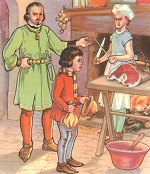 Little
Dick would have lived very happy in this good family if it had not been
for the ill-natured cook. She used to say: Little
Dick would have lived very happy in this good family if it had not been
for the ill-natured cook. She used to say:
‘You are under me,
so look
sharp; clean the spit and the dripping-pan, make the fires, wind up the
jack, and do all the scullery work nimbly, or —, and she would shake
the
ladle at him. Besides, she was so fond of basting that when she had no
meat to baste she would baste poor Dick’s head and shoulders with a
broom,
or anything else that happened to fall in her way. At last her
ill-usage
of him was told to Alice, Mr Fitzwarren’s daughter, who told the cook
she
should be turned away if she did not treat him kinder.
 The
behaviour of the cook was now a little better; but besides this, Dick
had
another hardship to get over. His bed stood in a garret, where there
were
so many holes in the floor and the walls that every night he was
tormented
with rats and mice. A gentleman having given Dick a penny for cleaning
his shoes, he thought he would buy a cat with it. The next day he saw a
girl with a cat, and asked her, ‘Will you let me have that cat for a
penny?’
The girl said: ‘Yes, that I will, master, though she is an excellent
mouser.’ The
behaviour of the cook was now a little better; but besides this, Dick
had
another hardship to get over. His bed stood in a garret, where there
were
so many holes in the floor and the walls that every night he was
tormented
with rats and mice. A gentleman having given Dick a penny for cleaning
his shoes, he thought he would buy a cat with it. The next day he saw a
girl with a cat, and asked her, ‘Will you let me have that cat for a
penny?’
The girl said: ‘Yes, that I will, master, though she is an excellent
mouser.’
Dick hid his cat in
the garret,
and always took care to carry a part of his dinner to her; and in a
short
time he had no more trouble with the rats and mice, but slept quite
sound
every night.
Soon after this,
his master
had a ship ready to sail; and as it was the custom that all his
servants
should have some chance for good fortune as well as himself, he called
them all into the parlour and asked them what they would send out.
They all had
something that
they were willing to venture except poor Dick, who had neither money
nor
goods, and therefore could send nothing. For this reason he did not
come
into the parlour with the rest; but Miss Alice guessed what was the
matter,
and ordered him to be called in. She then said: ‘I will lay down some
money
for him, from my own purse’; but her father told her: ‘This will not
do,
for it must be something of his own.’
When poor Dick
heard this,
he said: ‘I have nothing but a cat which I bought for a penny some time
since of a little girl.’
‘Fetch your cat
then, my lad,’
said Mr Fitzwarren, ‘and let her go.’
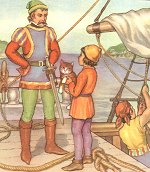 Dick
went upstairs and brought down poor puss, with tears in his eyes, and
gave
her to the captain; ‘for,’ he said, ‘I shall now be kept awake all
night
by the rats and mice.’ All the company laughed at Dick’s odd venture;
and
Miss Alice, who felt pity for him, gave him some money to buy another
cat. Dick
went upstairs and brought down poor puss, with tears in his eyes, and
gave
her to the captain; ‘for,’ he said, ‘I shall now be kept awake all
night
by the rats and mice.’ All the company laughed at Dick’s odd venture;
and
Miss Alice, who felt pity for him, gave him some money to buy another
cat.
This, and many
other marks
of kindness shown him by Miss Alice, made the ill-tempered cook jealous
of poor Dick, and she began to use him more cruelly than ever, and
always
made game of him for sending his cat to sea. She asked him: ‘Do you
think
your cat will sell for as much money as would buy a stick to beat you?’
At last poor Dick
could not
bear this usage any longer, and he thought he would run away from his
place;
so he packed up his few things, and started very early in the morning,
on All-Hallows Day, the first of November. He walked as far as
Holloway;
and there sat down on a stone, which to this day is called
‘Whittington’s
Stone’, and began to think to himself which road he should take.
While he was
thinking what
he should do, the Bells of Bow Church, which at that time were only
six,
began to ring, and at their sound seemed to say to him:
‘Turn
again, Whittington,
Thrice Lord Mayor
of London.’
‘Lord Mayor of
London!’ said he
to himself. ‘Why, to be sure, I would put up with almost anything now,
to be Lord Mayor of London, and ride in a fine coach, when I grow to be
a man! Well, I will go back, and think nothing of the cuffing and
scolding
of the old cook, if I am to be Lord Mayor of London at last.’
Dick went back, and
was lucky
enough to get into the house, and set about his work before the old
cook
came downstairs.
We must now follow
Miss Puss
to the coast of Africa. The ship with the cat on board was a long time
at sea; and was at last driven by the winds on a part of the coast of
Barbary,
where the only people were the Moors, unknown to the English. The
people
came in great numbers to see the sailors, because they were of
different
colour to themselves, and treated them civilly; and, when they became
better
acquainted, were very eager to buy the fine things that the ship was
loaded
with.
When the captain
saw this,
he sent patterns of the best things he had to the king of the country;
who was so much pleased with them that he sent for the captain to the
palace.
Here they were placed, as it is the custom of the country, on rich
carpets
flowered with gold and silver. The king and queen were seated at the
upper
end of the room; and a number of dishes were brought in for dinner.
They
had not sat long, when a vast number of rats and mice rushed in, and
devoured
all the meat in an instant. The captain wondered at this, and asked if
these vermin were not unpleasant.
‘Oh, yes,’ said
they, ‘very
offensive; and the king would give half his treasure to be freed of
them,
for they not only destroy his dinner, as you see, but they assault him
in his chamber, and even in bed, so that he is obliged to be watched
while
he is sleeping, for fear of them.’
The captain jumped
for joy;
he remembered poor Whittington and his cat, and told the king he had a
creature on board the ship that would dispatch all these vermin
immediately.
The king jumped so high at the joy which the news gave him that his
turban
dropped off his head. ‘Bring this creature to me,’ says he; ‘vermin are
dreadful in a court, and if she will perform what you say, I will load
your ship with gold and jewels in exchange for her.’
The captain, who
knew his business,
took his opportunity to set forth the merits of Miss Puss. He told his
majesty: ‘It is not very convenient to part with her, as, when she is
gone,
the rats and mice may destroy the goods in the ship — but to oblige
your
majesty, I will fetch her.’
‘Run, run!’ said
the queen;
‘I am impatient to see the dear creature.’
Away went the
captain to the
ship, while another dinner was got ready. He put Puss under his arm,
and
arrived at the place just in time to see the table full of rats. When
the
cat saw them, she did not wait for bidding, but jumped out of the
captain’s
arms, and in a few minutes laid almost all the rats and mice dead at
her
feet. The rest of them in their fright scampered away to their holes.
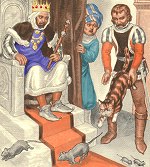 The
king was quite charmed to get rid so easily of such plagues, and the
queen
desired that the creature who had done them so great a kindness might
be
brought to her, that she might look at her. Upon which the captain
called:
‘Pussy, pussy, pussy!’ and she came to him. He then presented her to
the
queen, who started back, and was afraid to touch a creature who had
made
such a havoc among the rats and mice. However, when the captain stroked
the cat and called: ‘Pussy, pussy’, the queen also touched her and
cried:
‘Putty, putty’, for she had not learned English. He then put her down
on
the queen’s lap, where she purred and played with her majesty’s hand,
and
then purred herself to sleep. The
king was quite charmed to get rid so easily of such plagues, and the
queen
desired that the creature who had done them so great a kindness might
be
brought to her, that she might look at her. Upon which the captain
called:
‘Pussy, pussy, pussy!’ and she came to him. He then presented her to
the
queen, who started back, and was afraid to touch a creature who had
made
such a havoc among the rats and mice. However, when the captain stroked
the cat and called: ‘Pussy, pussy’, the queen also touched her and
cried:
‘Putty, putty’, for she had not learned English. He then put her down
on
the queen’s lap, where she purred and played with her majesty’s hand,
and
then purred herself to sleep.
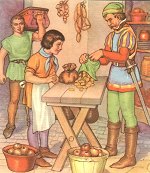 The
king, having seen the exploits of Miss Puss, and being informed that
her
kittens would stock the whole country, and keep it free from rats,
bargained
with the captain for the whole ship’s cargo, and then gave him ten
times
as much for the cat as all the rest amounted to. The
king, having seen the exploits of Miss Puss, and being informed that
her
kittens would stock the whole country, and keep it free from rats,
bargained
with the captain for the whole ship’s cargo, and then gave him ten
times
as much for the cat as all the rest amounted to.
The captain then
took leave
of the royal party, and set sail with a fair wind for England, and
after
a happy voyage arrived safe in London.
One morning, early,
Mr Fitzwarren
had just come to his counting-house and seated himself at the desk, to
count over the cash, and settle the business for the day, when somebody
came tap, tap, at the door. ‘Who’s there?’ said Mr Fitzwarren. ‘A
friend,’
answered the other; ‘I come to bring you good news of your ship Unicorn.’
The merchant, bustling up in such a hurry that he forgot his
gout,
opened the door, and who should he see waiting but the captain and
factor,
with a cabinet of jewels and a bill of lading; when he looked at this
the
merchant lifted up his eyes and thanked Heaven for sending him such a
prosperous
voyage.
They then told the
story of
the cat, and showed the rich present that the king and queen had sent
for
her to poor Dick. As soon as the merchant heard this, he called out to
his servants:
‘Go send
him in, and
tell him of his fame;
Pray call him Mr
Whittington
by name.’
Mr Fitzwarren now
showed himself
to be a good man; for when some of his servants said so great a
treasure
was too much for him, he answered: ‘God forbid I should deprive him of
the value of a single penny; it is his own, and he shall have it to a
farthing.’
He then sent for
Dick, who
at that time was scouring pots for the cook, and was quite dirty. He
would
have excused himself from coming into the counting-house, saying, ‘The
room is swept, and my shoes are dirty and full of hob-nails.’ But the
merchant
ordered him to come in.
Mr Fitzwarren
ordered a chair
to be set for him, and so he began to think they were making game of
him,
and at the same time said to them: ‘Do not play tricks with a poor
simple
boy, but let me go down again, if you please, to my work.’
‘Indeed, Mr
Whittington,’ said
the merchant, ‘we are all quite in earnest with you, and I most
heartily
rejoice in the news that these gentlemen have brought you; for the
captain
has sold your cat to the King of Barbary, and brought you in return for
her more riches than I possess in the whole world; and I wish you may
long
enjoy them!’
Mr Fitzwarren then
told the
men to open the great treasure they had brought with them, and said:
‘Mr
Whittington has nothing to do but to put it in some place of safety.’
Poor Dick hardly,
knew how
to behave himself for joy. He begged his master to take what part of it
he pleased, since he owed it all to his kindness. ‘No, no,’ answered Mr
Fitzwarren, ‘this is all your own; and I have no doubt but you will use
it well.’
Dick next asked his
mistress,
and then Miss Alice, to accept a part of his good fortune; but they
would
not, and at the same time told him they felt great joy at his good
success.
But this poor fellow was too kind-hearted to keep it all to himself; so
he made a present to the captain, the mate, and the rest of Mr
Fitzwarren’s
servants; and even to the ill-natured old cook.
After this Mr
Fitzwarren advised
him to send for a proper tailor, and get himself dressed like a
gentleman;
and told him he was welcome to live in his house till he could provide
himself with a better.
When Whittington’s
face was
washed, his hair curled, his hat cocked, and he was dressed in a nice
suit
of clothes, he was as handsome and genteel as any young man who visited
at Mr Fitzwarren’s; so that Miss Alice, who had once been so kind to
him,
and thought of him with pity, now looked upon him as fit to be her
sweetheart;
and the more so, no doubt, because Whittington was now always thinking
what he could do to oblige her, and making her the prettiest presents
that
could be.
 Mr
Fitzwarren soon saw their love for each other, and proposed to join
them
in marriage; and to this they both readily agreed. A day for the
wedding
was soon fixed; and they were attended to church by the Lord Mayor, the
court of aldermen, the sheriffs, and a great number of the richest
merchants
in London, whom they afterwards treated with a very rich feast. Mr
Fitzwarren soon saw their love for each other, and proposed to join
them
in marriage; and to this they both readily agreed. A day for the
wedding
was soon fixed; and they were attended to church by the Lord Mayor, the
court of aldermen, the sheriffs, and a great number of the richest
merchants
in London, whom they afterwards treated with a very rich feast.
History tells us
that Mr Whittington
and his lady lived in great splendour, and were very happy. They had
several
children. He was Sheriff of London, thrice Lord Mayor, and received the
honour of knighthood by Henry V.
He entertained this
king and
his queen at dinner, after his conquest of France, so grandly, that the
king said: ‘Never had prince such a subject’; when Sir Richard heard
this,
he said: ‘Never had subject such a prince.’
The figure of Sir
Richard Whittington
with his cat in his arms, carved in stone, was to be seen till the year
1780 over the archway of the old prison at Newgate, which he built for
criminals.
|

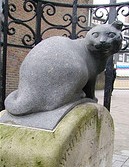
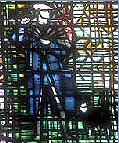 [left] Today there is a monument to his
cat near the
Whittington Stone pub at the foot of Highgate Hill where Dick sat down
and heard the famous Bow Bells of East London ring out:
[left] Today there is a monument to his
cat near the
Whittington Stone pub at the foot of Highgate Hill where Dick sat down
and heard the famous Bow Bells of East London ring out: In
the reign of the famous King Edward III there was a little boy called
Dick
Whittington whose father and mother died when he was very young. As
poor
Dick was not old enough to work, he was very badly off; he got but
little
for his dinner, and sometimes nothing at all for his breakfast; for the
people who lived in the village were very poor indeed, and could not
spare
him much more than the parings of potatoes, and now and then a hard
crust
of bread.
In
the reign of the famous King Edward III there was a little boy called
Dick
Whittington whose father and mother died when he was very young. As
poor
Dick was not old enough to work, he was very badly off; he got but
little
for his dinner, and sometimes nothing at all for his breakfast; for the
people who lived in the village were very poor indeed, and could not
spare
him much more than the parings of potatoes, and now and then a hard
crust
of bread.
 Little
Dick would have lived very happy in this good family if it had not been
for the ill-natured cook. She used to say:
Little
Dick would have lived very happy in this good family if it had not been
for the ill-natured cook. She used to say:  The
behaviour of the cook was now a little better; but besides this, Dick
had
another hardship to get over. His bed stood in a garret, where there
were
so many holes in the floor and the walls that every night he was
tormented
with rats and mice. A gentleman having given Dick a penny for cleaning
his shoes, he thought he would buy a cat with it. The next day he saw a
girl with a cat, and asked her, ‘Will you let me have that cat for a
penny?’
The girl said: ‘Yes, that I will, master, though she is an excellent
mouser.’
The
behaviour of the cook was now a little better; but besides this, Dick
had
another hardship to get over. His bed stood in a garret, where there
were
so many holes in the floor and the walls that every night he was
tormented
with rats and mice. A gentleman having given Dick a penny for cleaning
his shoes, he thought he would buy a cat with it. The next day he saw a
girl with a cat, and asked her, ‘Will you let me have that cat for a
penny?’
The girl said: ‘Yes, that I will, master, though she is an excellent
mouser.’
 Dick
went upstairs and brought down poor puss, with tears in his eyes, and
gave
her to the captain; ‘for,’ he said, ‘I shall now be kept awake all
night
by the rats and mice.’ All the company laughed at Dick’s odd venture;
and
Miss Alice, who felt pity for him, gave him some money to buy another
cat.
Dick
went upstairs and brought down poor puss, with tears in his eyes, and
gave
her to the captain; ‘for,’ he said, ‘I shall now be kept awake all
night
by the rats and mice.’ All the company laughed at Dick’s odd venture;
and
Miss Alice, who felt pity for him, gave him some money to buy another
cat.
 The
king was quite charmed to get rid so easily of such plagues, and the
queen
desired that the creature who had done them so great a kindness might
be
brought to her, that she might look at her. Upon which the captain
called:
‘Pussy, pussy, pussy!’ and she came to him. He then presented her to
the
queen, who started back, and was afraid to touch a creature who had
made
such a havoc among the rats and mice. However, when the captain stroked
the cat and called: ‘Pussy, pussy’, the queen also touched her and
cried:
‘Putty, putty’, for she had not learned English. He then put her down
on
the queen’s lap, where she purred and played with her majesty’s hand,
and
then purred herself to sleep.
The
king was quite charmed to get rid so easily of such plagues, and the
queen
desired that the creature who had done them so great a kindness might
be
brought to her, that she might look at her. Upon which the captain
called:
‘Pussy, pussy, pussy!’ and she came to him. He then presented her to
the
queen, who started back, and was afraid to touch a creature who had
made
such a havoc among the rats and mice. However, when the captain stroked
the cat and called: ‘Pussy, pussy’, the queen also touched her and
cried:
‘Putty, putty’, for she had not learned English. He then put her down
on
the queen’s lap, where she purred and played with her majesty’s hand,
and
then purred herself to sleep.  The
king, having seen the exploits of Miss Puss, and being informed that
her
kittens would stock the whole country, and keep it free from rats,
bargained
with the captain for the whole ship’s cargo, and then gave him ten
times
as much for the cat as all the rest amounted to.
The
king, having seen the exploits of Miss Puss, and being informed that
her
kittens would stock the whole country, and keep it free from rats,
bargained
with the captain for the whole ship’s cargo, and then gave him ten
times
as much for the cat as all the rest amounted to.  Mr
Fitzwarren soon saw their love for each other, and proposed to join
them
in marriage; and to this they both readily agreed. A day for the
wedding
was soon fixed; and they were attended to church by the Lord Mayor, the
court of aldermen, the sheriffs, and a great number of the richest
merchants
in London, whom they afterwards treated with a very rich feast.
Mr
Fitzwarren soon saw their love for each other, and proposed to join
them
in marriage; and to this they both readily agreed. A day for the
wedding
was soon fixed; and they were attended to church by the Lord Mayor, the
court of aldermen, the sheriffs, and a great number of the richest
merchants
in London, whom they afterwards treated with a very rich feast.